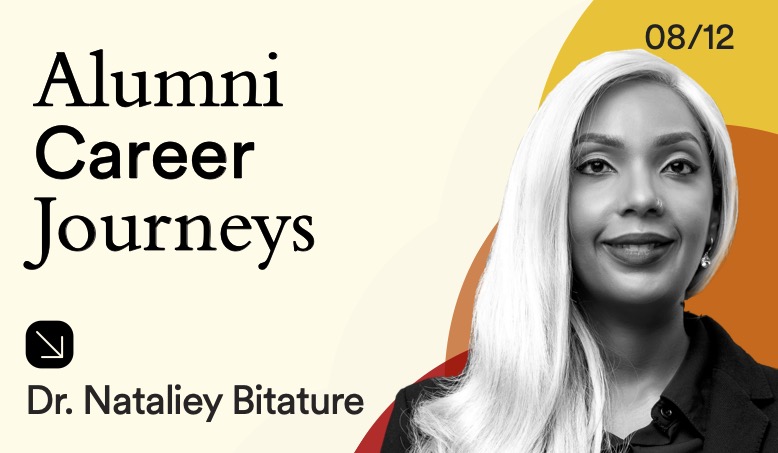This month, we had the honor of speaking with Class of 2016 graduate Dr. Nataliey Bitature as part of our 12 over 12 series, celebrating the inspiring career journeys of 12 Hult alumni over 12 months.
Having grown up in a family of entrepreneurs, Nataliey developed her formidable work ethic and problem-solving attitude from watching her parents manage their own business. However, she credits her time at Hult with pushing her beyond her comfort zone to show her the scale of what she can achieve.
With Hult San Francisco as her home campus, Nataliey focused her master’s studies on Social Entrepreneurship. Along with her classmates Manon Lavaud and Keisuke Kubota, she took on the 2016 Hult Prize, developing Musana Carts, solar-powered carts for street-food vendors in Uganda. It was an idea that took them all the way to the global finals in New York. Although they didn’t leave with the $1M USD top prize, her intensive real-world journey of entrepreneurship proved to be an invaluable education in business and resilience, setting Nataliey up for future success.
Today, Nataliey is Director of her family’s Simba Group of Companies in Uganda, where she works as “chief problem-solver,” fostering growth for nearly 1,000 employees across sectors including hospitality, media, energy, and real estate. She’s also passionate about sharing knowledge to empower other entrepreneurs, especially young women in Africa. Through her online mentorship platform HER, she teaches workshops on public speaking, goal setting, and financial literacy to support the success of aspiring female entrepreneurs. As well as being named in the 2018 Forbes 30 Under 30, she was awarded an honorary doctorate in 2020 in recognition of her incredible work.
We had the opportunity to speak to Dr. Nataliey about her personal career journey, her mindset for success, and what she hopes to achieve next.
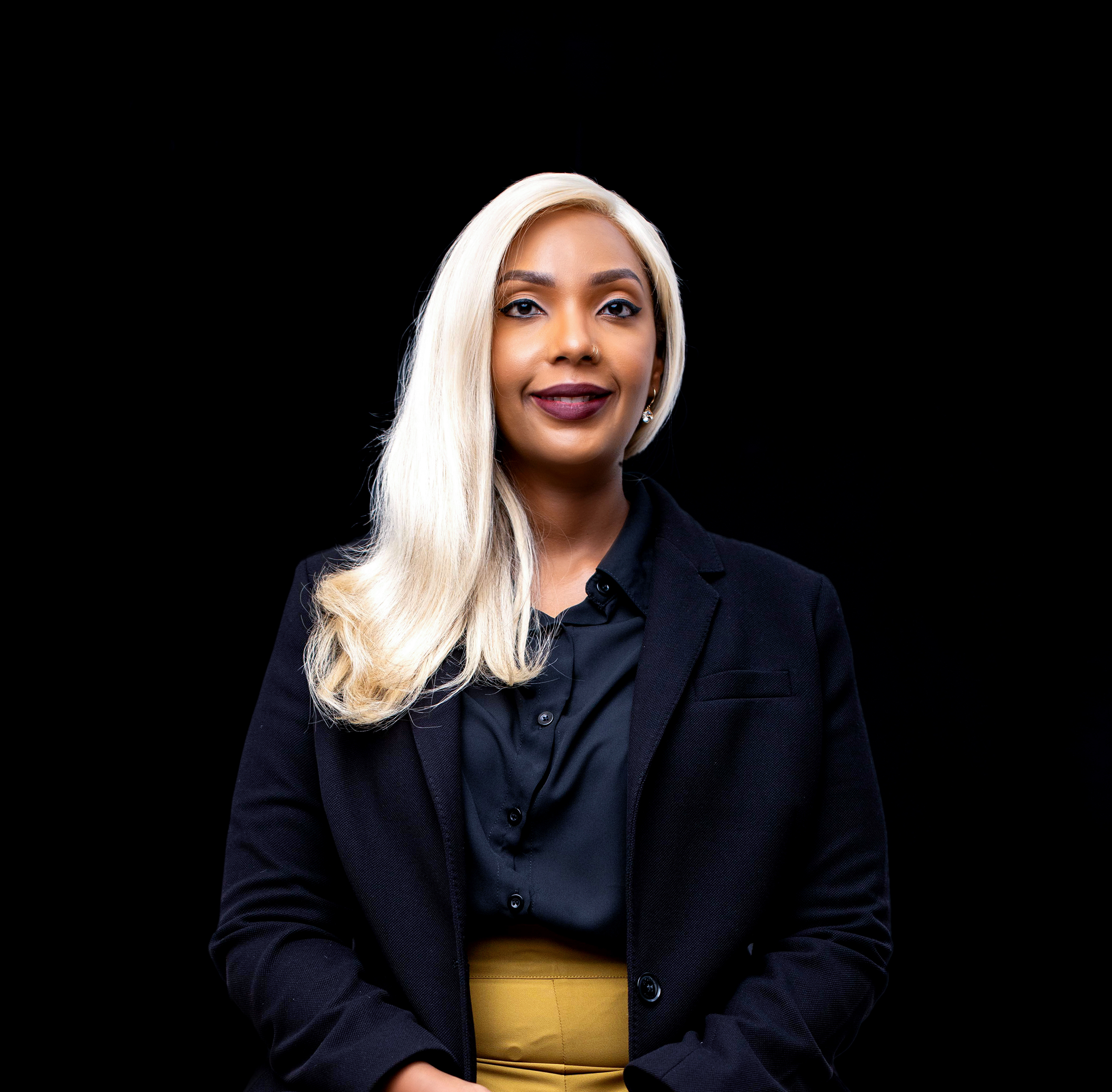

Hult: What was it like growing up in a family of entrepreneurs?
Nataliey: Both of my parents were entrepreneurs, and when we were kids, they used to take us to work with them—whether it was to construction sites or board meetings or interviews. And they just kind of let us run around and play in the background.
The way you grow up, you think is normal. It takes a few years to realize that other people don’t think the way you do or have the habits that you do, which are unique to your household. So, it wasn’t until I was a teenager that I realized a lot of the things I know about business, which I just thought were common sense, weren’t things that everyone knew.
I think I was always a very curious child, so as I grew up, I’d ask questions and my parents explained concepts to me about why they did what they did. The biggest thing that I learned from my parents is the attitude of solving your own problems. At the end of the day, if anything went wrong in the company, it would always end up with them to fix it. So I watched them having to stay up late to figure things out, or handle emergencies, or have to work when we’re on vacation. They always had to solve their own problems.
I think it’s something that my siblings and I are very grateful for, because we all have the same problem-solving attitude. And when it comes to working now, most of my job is about solving problems.
“The biggest thing that I learned from my parents is the attitude of solving your own problems.”
H: Did you know early on that you wanted to be in business like your parents?
N: I definitely didn’t want to do it. It looked very stressful! I always wanted to be a teacher. I still do—I have this dream that one day the businesses will run without me and I get to go teach at a school or university.
H: What would you teach?
N: I’d probably teach business!
H: What made you decide to study business at Hult?
N: I had a friend who had been to Hult and I just loved how you could live on different campuses around the world. I think I’ve always been used to traveling. When I was in high school in the UK, I would go to Uganda for my holidays. And when I lived in Uganda, I would be in England for my holidays.
I also really wanted to study social entrepreneurship, because at that point, I had been working in Uganda and I started to see gaps in my knowledge. Being good at business is one thing, but you have to do more. I wanted to understand the technical aspects of running a business in a more ethical way. When I checked out Hult, at the time they had a master’s program specializing in social entrepreneurship and I could study in San Francisco, so I was excited to do that.
H: Tell us about your experience.
N: That whole year was just amazing! I think because of the social entrepreneurship focus, the mindset you have is different from other business students. Your priorities are different, and your classmates, the professors, the books you’re reading, the events you’re going to, and what you’re thinking about is focused on more than just profit. It was an incredible experience to be with such like-minded people. As social entrepreneurs, the bar was set so high.
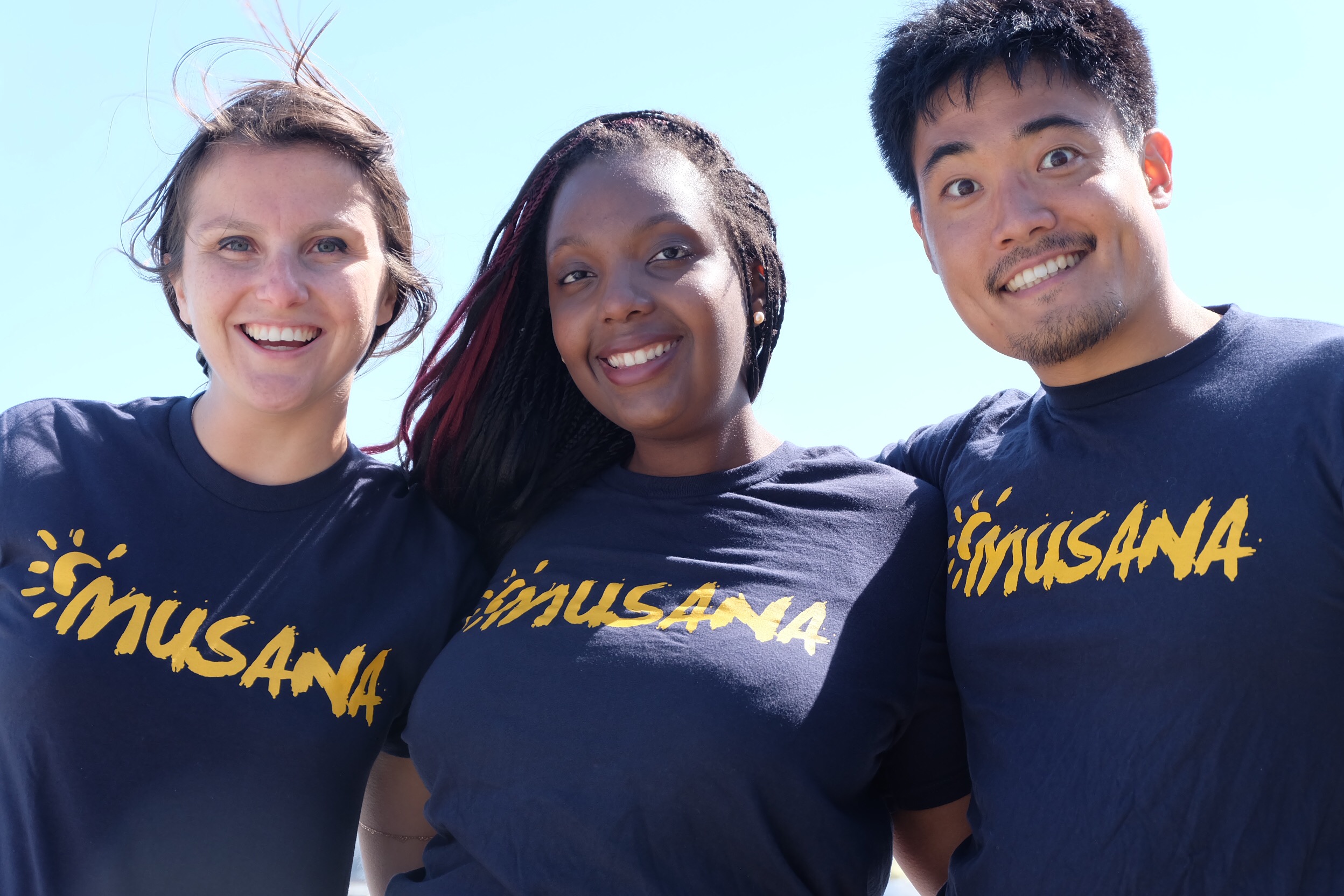

H: How did the idea of Musana Carts and taking on the Hult Prize come about?
N: It wasn’t originally my idea to participate in the Hult Prize. I was enjoying my time, and I didn’t want any more work—I was already so busy! But because we were concentrating on social business, my roommate Manon said to me, “Come on! What kind of social entrepreneurs would we be if we didn’t participate in the biggest social entrepreneurship contest in the world?” So, I reluctantly did it to get her off my case, assuming we wouldn’t get through.
Our initial business concept was based on solar backpacks in India. But about a week before the competition, we found out something that disproved our whole idea. It just wasn’t viable and we were devastated. We thought, “What are we going to do? Should we just withdraw?” But in business school, they’re always telling you: pivot, pivot, pivot.
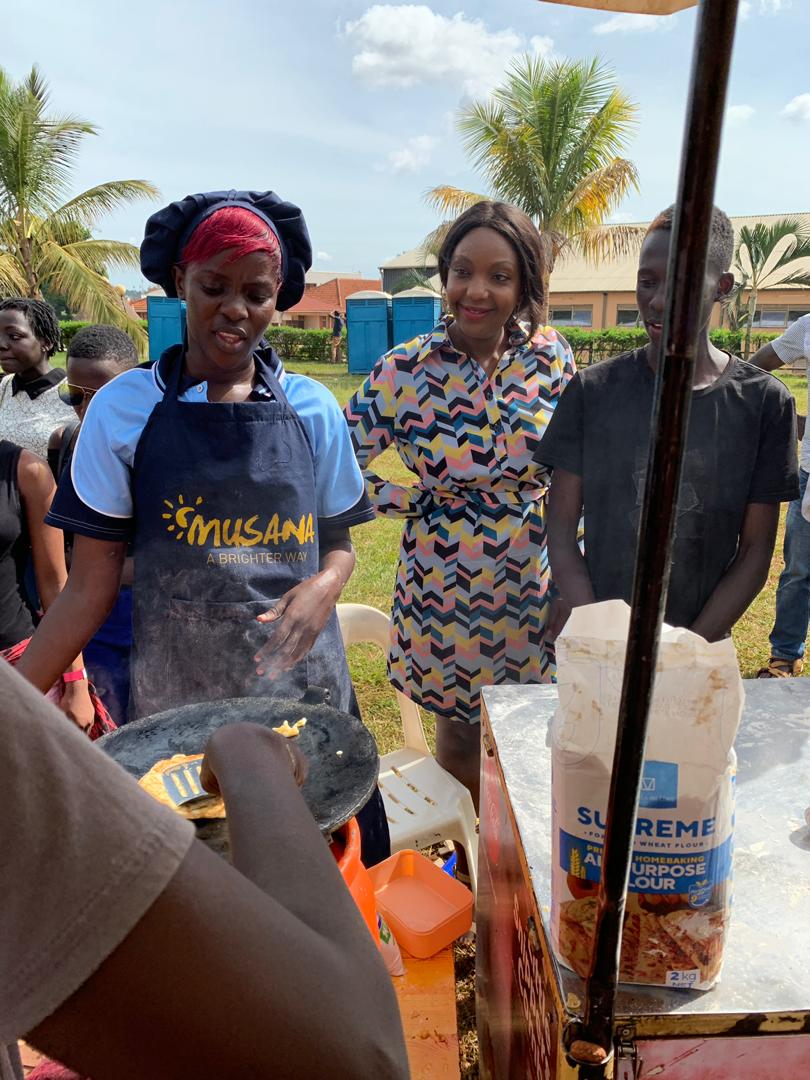

So, we shifted the whole idea. We wanted to do something with solar, so we started coming up with all these random ideas. I remember being in the classroom at night, because we were leaving campus around midnight every day at that point, and I was drawing on the board. I drew this hotdog stand with solar panels on the top. We kind of laughed about it, and then we kept brainstorming.
I don’t eat a lot of street food personally, but I’ve seen a lot of street food in Uganda. So I explained to my team what the street food in Uganda was like, and I got some pictures from the internet. We thought, “OK, let’s make it work.” It just happened so fast! We built a website, we worked on the pitch, and we won the regional finals! It wasn’t what we initially planned, but we put in a lot of effort and we had a lot of support from our professors, our classmates, and the entire campus.
By the time it culminated at the Global Finals in New York, we’d been to Uganda twice. We’d built the carts. We’d been in the field with a whole bunch of prototypes. We also had a lot of coaches, including a really cool pitch coach from Harvard who spent a lot of time with me. Because English is my first language, I did the majority of the pitch, and that has helped me so much in my career now, as I do a lot of public speaking.
The final pitch itself was very prestigious, with a lot of important people in the audience. We had so much support. It was very sad that we didn’t ultimately win—that was one of our big life lessons. But it was an amazing, unique journey for everyone involved, and I think it’s something that really shaped us.
H: What an incredible way to learn business!
N: I didn’t know I could work that hard until I was at Hult. I honestly didn’t know I had it in me. The amount we put in and pushed physically and mentally, I think taught me a lot. And it also showed me that anything is possible. Just to do a master’s in one year is difficult. But to do a master’s in one year in San Francisco in the kind of environment we were in, juggling school and Musana—it was an uphill struggle.
But it really showed me what capacity you can have in life. So now I don’t get overwhelmed with an idea or any amount of projects or things that have to happen. I’ll think, “Let’s see how to make it work!” I know now that you can always do so much more than you think you can.
“I didn’t know I could work that hard until I was at Hult. I honestly didn’t know I had it in me. It showed me that anything is possible.”
H: You also founded a company called HER. Can you tell us about that?
N: HER is another close-to-my-heart project. I didn’t intend to start it as a company, but because of Musana, I was doing so much PR and so many interviews that I started getting a lot of social media messages from women asking me for advice about business.
I started to respond to all the messages because I’m happy to help other women. But then it became overwhelming, so I started sharing information and responses through a WhatsApp group. At that time, I think WhatsApp had 100 people as a limit in a group. So eventually, I had three WhatsApp groups going. Then I started doing in-person workshops. So say, on a Saturday, come to my office and we can talk about your questions, or we’ll have a topic and a theme to discuss, and whoever would like to attend can. Since it’s a women-only space, other women felt comfortable to share and to ask questions. Eventually, I started bringing in guest speakers, because I’m not an expert on everything.
And then the pandemic happened and we had to stop doing the in-person meetings. I started filming videos instead, so we could keep the community alive and growing. During Covid, it went from 200 women to 6,000 in about three months. I guess everyone was stuck at home and had time! I turned it into a Facebook group and that’s how the community was built.
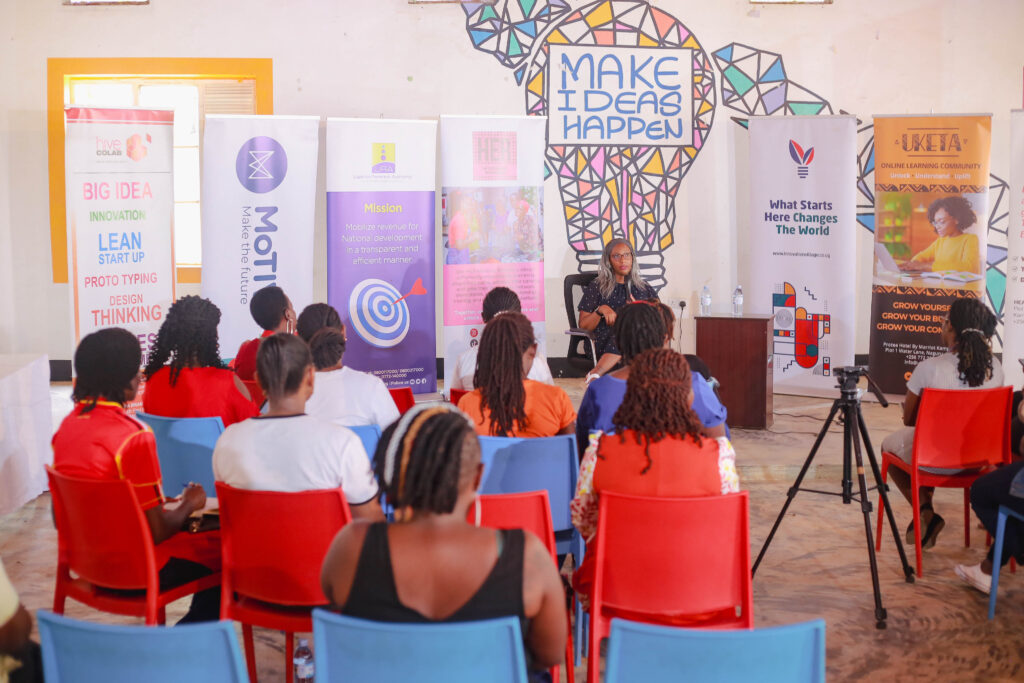

After Covid, everyone’s life had to pick up and I had to go back to my full-time job. So now we have a team running monthly events. We do two in Kampala, one in Jinja, and one in Mbarara. These are physical events where women entrepreneurs can come and present their products and have stalls, like a marketplace. We also have guest speakers who come and share their stories and experiences. We keep it strictly women-only, and I think that really helps with the level of comfort that women have. Our guest speakers talk about entrepreneurship, but some of them will also talk about their miscarriages or sexual harassment in the workplace—things that men don’t have to face while they run a business, but women are facing every day.
I’m very proud of how HER has grown and kind of taken on a life of its own. I don’t even have to show up physically at any of the events anymore—it’s run by the women. I love that it has this cooperative attitude. I don’t really think of myself as the founder, it’s more like I just facilitated an idea and I want to keep encouraging it to grow.
H: How incredible to grow such an impactful community from a simple WhatsApp chat group!
N: It’s very surprising, and it makes me so happy because in these kinds of spaces, no one feels stupid and no one is scared to ask questions or get some extra help. And the help makes a huge difference. Actually, because HER has been doing so well, we get a lot of complaints that it’s discrimination against men and we need to let men into the events so they can learn too! At first I thought, “Yeah, no. That’s not my problem.”
But then I decided to see what we can do. So last year, we spun out an online training company and made it a whole separate brand. It’s called UKETA Learning. All the online courses are short, taught by local experts, and are practical and actionable. Things like: “How to Start a Career in Digital Content Creation.” I personally do a course on public speaking. The courses are very inexpensive, so they’re accessible. And it’s unisex, so we have male coaches and welcome male students.
We also have a chat function on the courses where you can talk to the coaches and get feedback. Sometimes people will do my public speaking course, and after they’ll send me a video of them doing a speech and say, “How can I improve?” It’s really nice to be able to help other people grow. And it satisfies the teacher in me a little bit.
It’s also a nice way to contribute, because there are so many young people who need access to this information. When you look at the statistics about Africa and the population, it’s just wild: the underemployed, the unemployed, and the amount of entrepreneurs that are struggling. And yet these skills are so accessible. Everyone has data on their smartphones now and is watching TikTok, so if you’re spending time watching videos on your phone anyway, you might as well get a skill and a certificate!
H: What’s been a career highlight for you?
N: I do think a lot about Musana Carts because it took me off the autopilot path that I was on and really started my life. It meant a lot to me.
I was also awarded an honorary PhD from my alma mater in the UK, Keele University, because of the innovation of Musana and my work with women, which was also really special. And now everybody calls me Doctor, which is funny. So that has been a highlight.
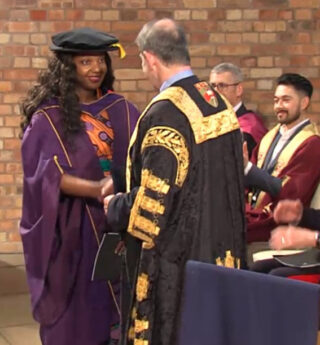

But I think, honestly, for me, it’s the small moments at HER events. I like sneaking into the back of an event and just observing and taking it all in. Because you see it in someone’s face when something clicks for them. I think that’s what I like about teaching—when you teach someone a concept or you open their mind to something that they didn’t know existed, you see their eyes light up. And at the HER events, you see that so much. You see them talk about a business or meet someone or hear a story or feel connected or feel inspired, and you can see it immediately in their face. And then, in that moment, I know this woman’s life is never going to be the same. Those moments are so exciting and inspiring, and it’s what keeps me going on the tough days. Those moments make it all worth it.
H: How do you find time to do it all?
N: I once saw a mug that said, “You have the same 24 hours in the day as Beyonce.” So I can’t complain. You just have to be organized. And you have to have a good support system.
Once I started working as Chief of Staff at Simba, I still had Musana and I was responsible for about eight different companies. I just had to learn how to get more things done. I think I’ve always been a type-A personality and I value efficiency and organization. But I realized that I can’t just coast. So, I started reading all these efficiency and productivity books, and about performance coaching, so that I can become efficient. I think that’s what really helped me.
H: What do you enjoy most about your role at Simba Group?
N: I really love the variety. I used to wish that I had a job where it was routine and I knew what I was going to do every day. Now, I realize that was just never going to be my path. I love that every day I’m going to deal with different sectors and different people and different problems and new things. I think it keeps me alert and challenged. I get to meet so many people and go to so many places and so many doors are open.
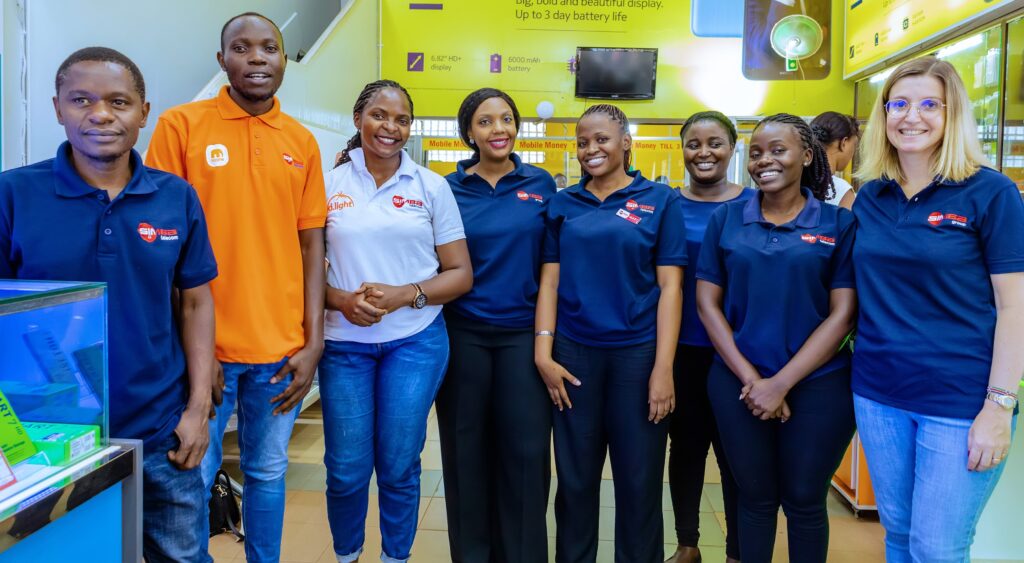

I love interacting with people and listening to people and learning about all the different capacities of human beings and the things that are possible in the world. So, whether it’s meeting someone new, or speaking at an event, or going to a conference, or reading an article about some new innovation or how something is changing, variety really inspires me and keeps me going.
“I love that every day I’m going to deal with different sectors and different people and different problems and new things.”
H: So, what’s next in your career?
N: Now that we have sort of figured out the mentorship piece and the education piece in HER, for the women, I want to figure out the capital part.
I think it’s a really exciting time for FinTech in Africa. There’s so much happening, there’s so much evolving, but access to capital is still a massive problem. The women on my team say we’re going to start a bank, which I think is a bit ambitious to build a whole women’s bank as none of us are bankers. But, I think we should try to figure out how to get women who don’t have land or assets or collateral, easy access to finance and build a system to support them. The current situation with banks and loans is that you’re the enemy, and they try to find reasons not to give you the money. I think that’s the wrong attitude, and having spent so much time now with women entrepreneurs, I want to be the person that believes in them and backs them up. So, I guess we’re building a bank!
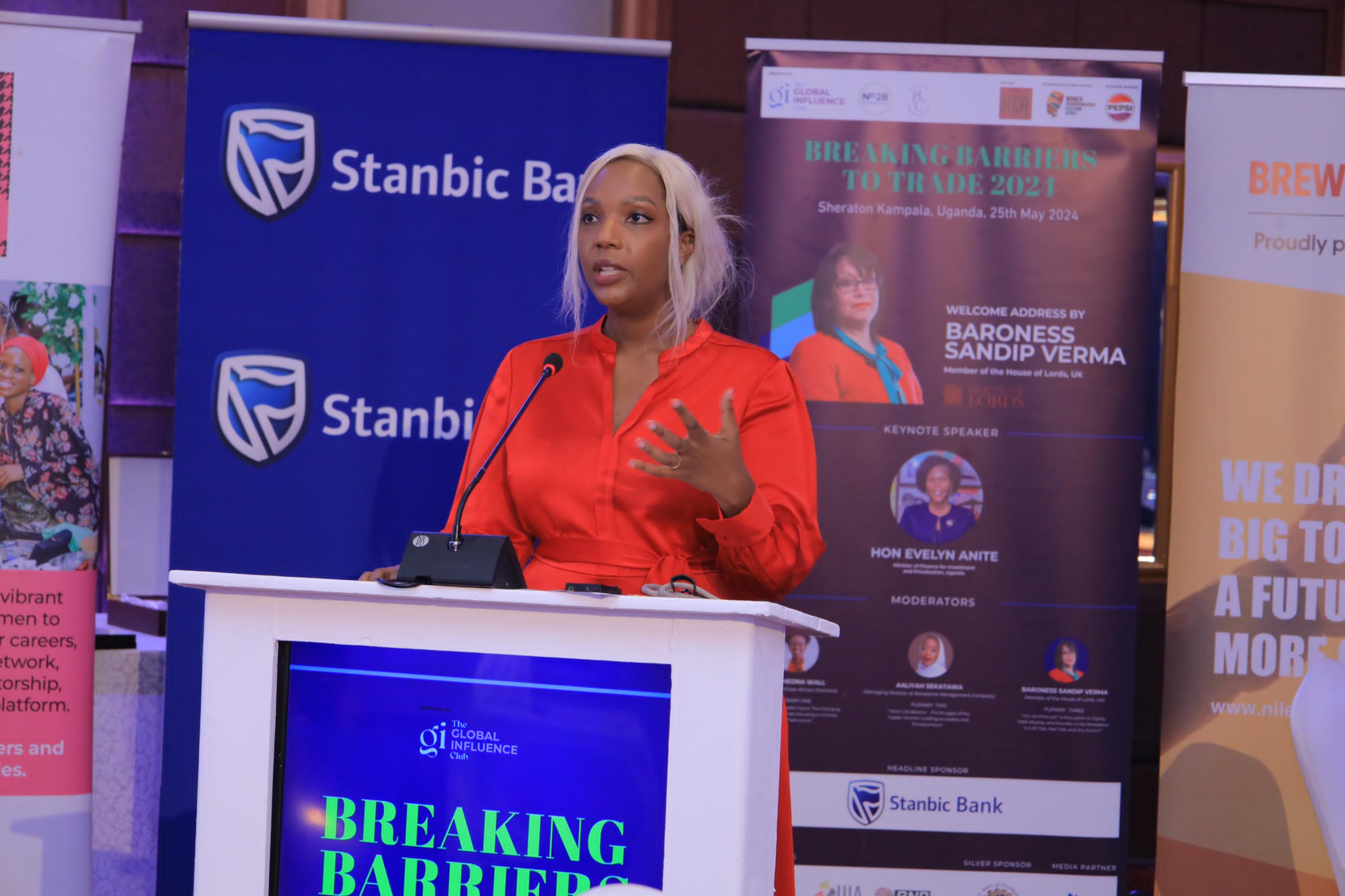

H: What advice would you give to someone who aspires to have a career with impact?
N: I would say the first thing is to be intentional about it. If I hadn’t left Uganda and the comfort of my life to go to Hult and to study social entrepreneurship, I would have never accomplished what I have. So, I think when you know that it’s something you want, don’t be ashamed of it or put it off by saying, “I’ll do it one day,” or “I’ll do it when I retire.” Go out now and seek it!
But also, be open minded. It’s not one specific path that’s going to give you what you want. You can’t plan out everything perfectly, but you can try to put yourself out there. If you have a closed mind and say no to a lot of things, especially when you’re young, you do yourself a disservice. The universe has all these options and we don’t know what’s in store for us. So go with it and keep an open mind, and then let the universe do its thing.
I call it, “Beliverance.” It’s a word my friends and I made up, where you have faith and determination that something will happen. I think to make believerance work, to have faith that something is going to happen, you also have to put yourself in a position to make it easy for the universe to help you. It isn’t going to find you while you’re at home watching TV. You have to be out there trying different things for the perfect thing to find you.
“If you have a closed mind and say no to a lot of things, you do yourself a disservice. The universe has all these options and we don’t know what’s in store for us. So go with it and keep an open mind.”


